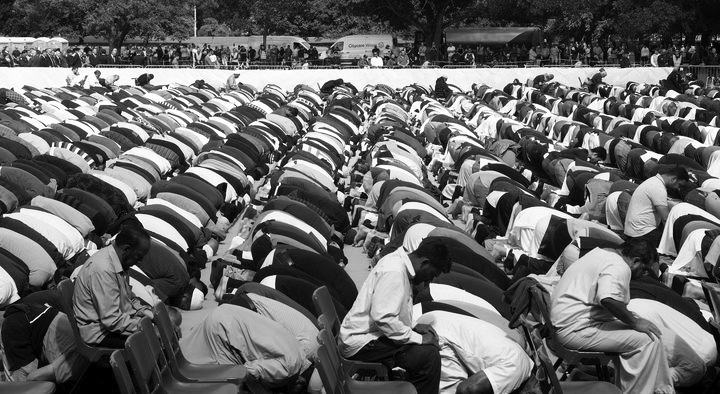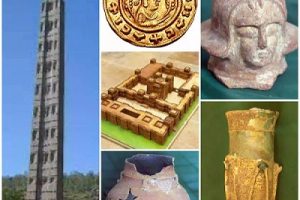
The world is presently torn apart by doctrinal misinterpretations of the Kuran and bitter disputes, religious schisms and intolerance leading to what is nowadays known as ‘political Islam’. Extremist actions of so-called Jihadists have led to devastating conflicts that continue to claim hundreds of thousands of lives around the world. The turmoil does not seem to abet and rages on from Syria to Nigeria and Somalia, from Indonesia to Sri Lanka.
On the other side of the spectrum, Ethiopia is undergoing a kind of spiritual revival whereby people have started to enjoy equal opportunity for exercising their beliefs without infringing upon the rights of other religious groups. This is no doubt an unprecedented chance that the ongoing quest for freedom and democracy has created. The long journey has started but it is not yet complete.
Islam has a long history in Ethiopia. It has passed through many trials and tribulations to reach the present stage of relative harmony and the peaceful coexistence of all religious denominations. According to Ahmedin Jebel, an Ethiopian scholar on Islamic affairs, Ethiopia is almost the first country to welcome Islam and Muslims at a time of great persecution and sufferings in Mecca, the birthplace of the religion.
According to some writers and historians, the expansion of the Imperial state in the 19th century brought has brought with it the expansion of Ethiopian sovereignty. Bender, an authority on Ethiopia’s ethnic and linguistic diversity says for instance that, “ The diversity of the new state’s populations encompassed culture, economy, and language, with ‘about a dozen Semitic languages, 22 Cushitic, 18 Omotic, and 18 Nilo-Saharan’. It extended to religion, with each of the four major categories of animism/Paganism, Judaism, and Islam”
John Markakis on his part considers the expansion of the Ethiopia nation- state as being one of the causes of ensuing conflicts along ethnic and religious lines. He says, “The expansion that established the present borders of Ethiopia also sowed the seeds of future conflict. While Abyssinia had been a relatively homogenous state with deep Christian roots, the newly acquired territories were inhabited by a large number of ethnic groups among whom Islam predominated. (Markakis 2000:8)”
Islam in Ethiopia has long existed as the second biggest faith. However, its place in society and politics was never commensurate with its numerical strength. It has been relegated to a marginal position suffering exclusion from the centers of decision making at the top levels of government as well as the lower echelons of regional administration. Territories with majority Muslim populations, such as Harar and Jimma for instance, were ruled by Christian governors sent from the center and the local people were disfranchised. This was largely the case under the imperial administrations, including under the modernizing rule of Emperor Haile Sellassie until the Revolution of February 1974.
A number of foreign scholars consider the Italian occupation of Ethiopia as a watershed moment when Islam carried favor from the Italian colonial authorities who tried to divide and rule the country along ethnic and religious lines. Italian scholar Sabacci for instance says, among other things that, “Oromo oppression under Amhara domination became the central theme of Italian propaganda and of de-Amharization campaigns. Amharic was displaced as the legal language; and Arabic, Oromonya and Kaffinya were taught in schools. (Sbacchi 1985:160)”.
According to the same author, the allegation or the rhetoric of Oromo oppression by the Amhara was born during the Italian occupation. In this connection, it is important to note that this rhetoric has also served as the central thesis of TPLF’s quest for the illusion of creating a so-called independent “Tigrayan republic” as formulated in the ill-fated 1976 TPLF Manifesto.
However Perham, another scholar, sheds some critical light on this assumption by saying that , “Despite the Italians’ best efforts Oromo ‘nobles and ordinary people were perplexed and disoriented’ by the conquest, and remained ‘mistrustful’. Eminently more reliable was the response from Ethiopia’s Muslims who ‘gave the Italians unconditional help in return for the Italian government’s support of their religion and institutions’.
“Poor relations with the Ethiopian Orthodox Church were a function of Italian attempts to curry favor with Ethiopian nationalist sentiment by removing it from the orbit of Alexandria (Perham 1969:124). More importantly, however, they reflected Italian support for Islam, of which Mussolini sought to present himself as a regional champion”
Sbachi also says that the period of Italian occupation saw an intensive program of mosque construction, and a number of schemes for the establishment of centers of Islamic study and propaganda (Sbacchi 1985:36,162-4). The end of Italian occupation was followed by the restoration of the monarchy and the status quo ante, as far as relations between the Ethiopian State and Islam was concerned.
The Ethiopian Revolution of 1974 was also another watershed moment in relation between state and religion and determined the fate of Islam for a long time. Christopher Clapham, a scholar who wrote extensively on Ethiopian politics says on this point that, “The Dergue promised the abolition of traditional customs which ‘hamper the unity and progress of Ethiopia’, and removed the official status (and much of the property) of the Orthodox Church whilst recognizing Islam. It tolerated an upsurge in the printing, broadcasting and teaching of languages other than Amharic, and an enthusiasm for cultural diversity. At the political level, however, there was little room for maneuver.”
Despite the Dergue’s recognition of Islam however, the religion remained largely marginalized as far as political empowerment was concerned while the official recognition of Islamic festivities as national holidays. This is in fact the major concession the Dergue has made by way of recognizing Islam as one of the major religions of Ethiopia.
The EPRDF rule that stretched for almost 30 years now has made little addition to the Dergue’s concession while bringing in a few Muslim ministers to the government portfolio, a move that had more symbolic than real significance. This did not satisfy many adherents of the Muslim faith who continued their struggle for further expansion of the space for freedom and religious tolerance.
The major mistake of the EPRDF government under TPLF tutelage was its attempt to control the minds and institutions of Muslims by using all means at its disposal, including violence, imprisonment and torture. Since 2014, the contradiction between the TPLF-controlled state and the majority of the Muslim communities became more acute and led to open confrontations. The other related mistake was for the government to claim secularism as it principle while blatantly interfering in religious affairs to support one side and demonize the other.
As a direct consequence of this, a kind of Islamic consciousness was on the rise and civic resistance grew in the following years, leading to the imprisonment and tortures of leading Islamic scholars, activists and community leaders. This is turn led to the division of Islamic leaders along political lines. One faction of the top leadership was allied to the regime in power and cooperated in undermining the quest for more freedom. Muslim scholars who dissented and tried to serve as the voice of the majority of Muslims finally won the day as the popular protests led to the defeat and resignation of the previous arrogant, divisive and brutal regime.
The growth of popular protest against the TPLF-led clique grew by leaps and bounds. Islamic aspirations merged with the general popular aspiration for freedom and democracy and became one of its driving forces for change as they did during the popular uprising back in February 1974 Revolution. As the regime was increasingly cornered on both sides, it agreed to reform itself from within by allowing a new reformist-minded leadership to take power within the larger EPRDF party.
The last one years since the advent of the reformist wing of the EPRDF to power, Islamic aspirations seem to have found better expressions. They are increasingly merged with the general democratic transformations that the people of Ethiopia are waiting for. Unlike in other countries with relatively large Islamic populations, Muslims in Ethiopia have never asked for political power or formed extremist groups despite domestic and foreign pressures in that direction. Muslims in Ethiopia are relatively peaceful, law-abiding and refrain from adopting extremist positions on national or local issues.
The brand of Ethiopian Islam, unlike those we observe in other countries where the faith is high jacked by extremists of all colors and brands, is a moderate one with strong traditional and cultural connections to other religious communities. Recent developments, such as the peaceful resolution of the contradictions among the Muslim communities, the leadership crisis that has exacerbated the situation in the last four or five years, have all contributed to normalization of relations between the EPRDF state and the Islamic movement. The fact that Muslims in Ethiopia have not set an agenda different from the democratic and peaceful aspirations of the Ethiopian people seems to have helped matters a great deal despite attempts to “radicalize” the faith and serve as a vehicle for different political agendas.
Under these circumstances, it is quite obvious that the fate of Muslims in Ethiopia is interwoven with the fate of democracy, peace and mutual respect with the people of different nationalities and ethnic groups. However, this aspiration will have to find legal and institutional guarantees if it is to be durable or sustainable in the midst of the rising waves of ethnic separatism, extremists nationalism and populist propaganda that feed the violence and massive population displacements that have become the daily obsessions of the local media. As Ethiopian Muslims celebrate the end of the holy month of Ramadan, they should be mindful of the long and complex road ahead until a democratic order would be created under which their centuries old aspirations would find practical expression.
The Ethiopian Herald Sunday June 9, 2019
BY MULUGETA GUDETA





